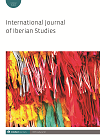- Home
- A-Z Publications
- International Journal of Iberian Studies
- Previous Issues
- Volume 25, Issue 2, 2012
International Journal of Iberian Studies - Volume 25, Issue 2, 2012
Volume 25, Issue 2, 2012
-
-
Globalization, regional television and national identity: The case of Vaya Semanita/What a Week
More LessThis article looks at Vaya Semanita/What a Week, a sketch programme on Euskal Telebista 2 (ETB2), the Spanish-language channel of Basque Television, as a case study for illustrating the complex relationships between regional, national and global television cultures, and between local television and its audiences. It will consider some reasons for the programme’s popularity through textual analysis (with particular attention to its representation of Basque national/cultural identity, and to how the sketch format is used for that purpose) and contextual study (the programme’s location within its media environment and the socio-historical circumstances of its production, dissemination and consumption). The discussion will be situated within the debates regarding the principles of public service broadcasting and television globalization and within the history of a public broadcasting institution with a mission to express and strengthen national identity. The show can be examined for the insights it offers into Basque national identity and its changes through time.
-
-
-
La actitud ética de los periodistas españoles frente a los conflictos de intereses
More LessAuthors: Lorena R. Romero Domínguez and Juan Carlos Suárez VillegasEl presente artículo muestra los resultados obtenidos en el Proyecto de Investigación ‘Ética informativa y excelencia: la deontología periodística frente a las expectativas de la ciudadanía’, desarrollado por las universidades Pompeu Fabra (Barcelona), Carlos III (Madrid), Universidad del País Vasco y Universidad de Sevilla. El objetivo de la investigación, financiada por el Ministerio de Educación y Ciencia (Plan Nacional de I+D+I 2004–2007), consistió en analizar las actitudes de los profesionales de la información al objeto de contrastar cómo factores ajenos a la información pueden afectar su rutina productiva. Para el presente artículo nos hemos centrado en los conflictos de intereses, analizando, por un lado, la actitud de los periodistas frente a los regalos y otros beneficios obtenidos de su fuente; y, por otro, explicando la relación del profesional con las compañías que se anuncian en los medios de comunicación.
-
-
-
Television consumption trends among the ‘digital generation’ in Spain
More LessAuthors: Patricia González Aldea and Nereida López VidalesThe development of new technologies is changing the habits of television consumption among young people. The multiplication of channels has intensified the fragmentation of the market and its audiences and the individualist atomization in the media preferences and consumption. This article is part of a research project aiming to establish television consumption preferences, opinions and habits of Spanish young people, aged between 14 and 25 years, and the differences between the two groups into which the respondents were divided (14–17 and 18–25). The article shows the extent to which Spanish youngsters have turned to new media as a source of entertainment.Indeed, one of the most groundbreaking results that should be highlighted is the difference between the two groups in their approach to the Internet as a source of entertainment.The article shows how the digital generation demands the adaptation of television content to the new platforms – such as the Internet or mobile phone – and the renewal of television formats. The findings of this study also point to trend indicators and guidelines that advertisers and media companies might be interested in when designing new creative and innovative television content.
-
-
-
The politics of vocational training of industrial technicians in Spain, 1924–30
More LessIn this study, I examine the extent to which technical education served to form a new middle class of industrial technicians during the dictatorship of Primo de Rivera in Spain. The principal means of achieving this, the Industrial Education Statute of 1924 and the Vocational Training Statute of 1928, were aimed at the working classes and the petty bourgeoisie. The intention was that both groups would support the State’s social and corporative system whilst at the same time promoting the country’s modernization. The great gap between economic and social reality, however, led to the failure of this educational project.
-
-
-
BOOK REVIEW
More LessDEMOCRACY, TRADE UNIONS AND POLITICAL VIOLENCE IN SPAIN. THE VALENCIAN ANARCHIST MOVEMENT, 1918–1936, RICHARD PURKISS (2011) Eastbourne, Portland and Ontario: Sussex Academic Press (in association with the Cañada Blanch Centre for Contemporary Spanish Studies), 320 pp., ISBN 978-1-84519-461-1 (hbk), £55
-
Volumes & issues
-
Volume 37 (2024)
-
Volume 36 (2023)
-
Volume 35 (2022)
-
Volume 34 (2021)
-
Volume 33 (2020)
-
Volume 32 (2019)
-
Volume 31 (2018)
-
Volume 30 (2017)
-
Volume 29 (2016)
-
Volume 28 (2015)
-
Volume 27 (2014)
-
Volume 26 (2013)
-
Volume 25 (2012)
-
Volume 24 (2011 - 2012)
-
Volume 23 (2010)
-
Volume 22 (2009)
-
Volume 21 (2008)
-
Volume 20 (2007)
-
Volume 19 (2006 - 2007)
-
Volume 18 (2005)
-
Volume 17 (2004)
-
Volume 16 (2003 - 2004)
-
Volume 15 (2002 - 2003)
-
Volume 14 (2001)
Most Read This Month


